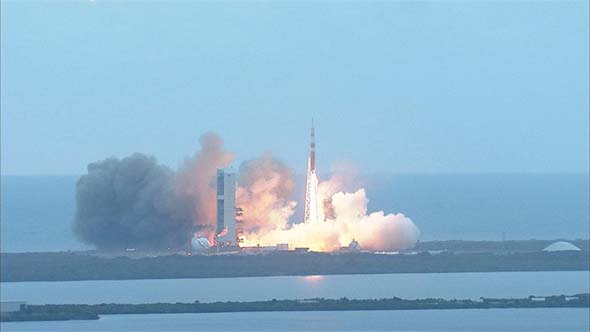This morning, the first step on the road to a manned mission to Mars was taken. NASA's Orion space capsule successfully completed its first dual-orbital test flight and splashed down in the Pacific Ocean.
The space craft finally launched this morning from Cape Canaveral Air Force base a little after 7 am Eastern time, after having been delayed for a day due to technical problems and poor weather. After a four-and-a-half-hour flight in which the spacecraft orbited the Earth twice at an altitude of 3600 miles, the capsule re-entered the atmosphere, deployed its parachutes, and landed gently in the Pacific Ocean.
This flight is the first step in a planned manned mission to Mars that is expected to take place within the next 25 years, assuming that it doesn't get derailed by political or monetary issues.
This is exactly the kind of mission that advocates argued would be encouraged by the termination of the space shuttle program. Critics argued that the space shuttle made access to earth's orbit too easy and reliable, and "tethered" NASA to low-earth orbit, instead of finding innovative new ways to reach further into space. The launch of Orion three-and-a-half years later seems to somewhat validate that opinion. The space shuttle was an expensive program, and its budget significantly reduced the amount of funds available for more ambitious projects. Despite successes with sending robots to Mars, manned missions always seemed to be on the backburner for NASA. Now, with no space shuttle program to manage, NASA can look to Mars!
And NASA isn't the only organization that is looking towards manned missions to Mars. Private companies are also getting in on it. Companies like SpaceX have also proposed possible Mars missions using its own proprietary spacecraft designs. If the Soviet Union provided a competitive incentive for NASA to get to the moon in the 60's, perhaps the competition of private agencies (and maybe even China's up-and-coming space program) could kick NASA's complacency and motivate the agency to press forward to Mars and beyond.
I've been hearing that manned missions to Mars are "twenty or thirty years away" for as long as I remember, but it was always an empty-promise that felt just over the horizon. No one ever made serious efforts on a mission to Mars. Now, for the first time, actual efforts are being made, so the promise of "Mars in twenty or thirty years" finally seems real!

NASA's Orion space craft launches from Cape Canaveral for a four-hour test flight.
The final frontier feels a little closer today.
ba8efa03-b9f9-484b-930e-b406ee908904|0|.0
Tags:Orion, NASA, National Aeronautics and Space Administration, science, Mars, orbit, space shuttle, Apollo, Cape Canaveral, SpaceX, China